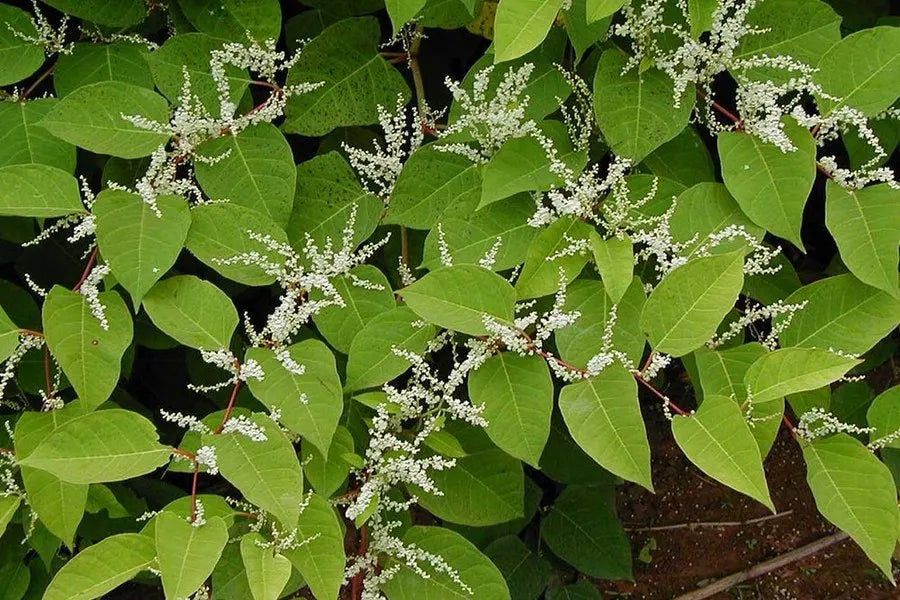When most people hear about Japanese knotweed (Reynoutria japonica), they think of it as an invasive plant wreaking havoc in gardens and wild spaces. But beyond its aggressive growth lies a powerful medicinal herb with deep roots in Traditional Chinese Medicine (TCM). This resilient plant is rich in compounds that can benefit not only humans but also our beloved pets.
Let’s explore how Japanese knotweed supports the health of dogs and cats, its appropriate dosage, and its role in TCM.
🌿 What Is Japanese Knotweed?
Japanese knotweed is a perennial plant originally from East Asia. In TCM, it is known as Hu Zhang (虎杖) and has been used for centuries to clear heat, resolve toxins, invigorate blood flow, and support the liver and cardiovascular system.
The main active compound in knotweed is resveratrol, a well-known antioxidant also found in grapes and red wine. It also contains emodin, polydatin, and other polyphenols with anti-inflammatory, antimicrobial, and immune-modulating properties.
🐾 Benefits of Japanese Knotweed for Dogs & Cats
1. Anti-inflammatory & Antioxidant Support
Resveratrol and other antioxidants in knotweed help reduce oxidative stress and inflammation, supporting overall vitality and longevity.
-
Helpful for senior pets with arthritis or general aging concerns
-
May assist in reducing inflammation associated with chronic diseases
2. Immune System Modulation
Japanese knotweed supports immune balance, which can be useful in cases of:
-
Lyme disease and other tick-borne illnesses (it’s a favorite herb among holistic vets managing Lyme)
-
Chronic infections
-
Autoimmune imbalances
3. Liver & Cardiovascular Support
In TCM, Hu Zhang helps move the blood and supports liver detoxification. This can be helpful for pets with:
-
Liver stress or toxin exposure
-
Heart conditions needing circulatory support
4. Natural Antimicrobial Properties
Compounds like emodin have shown antimicrobial effects against certain bacteria, viruses, and fungi, providing an additional layer of natural defense.
🌱 Japanese Knotweed in Traditional Chinese Medicine (TCM)
In TCM, Hu Zhang is categorized as a "Heat-Clearing & Toxin-Resolving" herb. It is traditionally used to:
-
Clear heat and dampness from the body
-
Promote blood circulation and remove blood stasis
-
Support wound healing and skin conditions
-
Address musculoskeletal discomfort
For animals, these actions translate to support in conditions such as:
-
Hot, inflamed skin irritations
-
Chronic musculoskeletal pain
-
Toxin accumulation (e.g., from environmental exposures)
⚖️ Dosage Guidelines for Pets
Dosage depends on the form (powdered herb, tincture, or extract) and the specific condition being treated. Always consult a veterinarian trained in herbal medicine before starting your pet on Japanese knotweed.
General Guidelines (for powdered herb):
-
Dogs: 50–200 mg per 10 lbs of body weight, divided daily
-
Cats: 25–100 mg per day, depending on size and condition
Tincture (1:5 in 50% alcohol, glycerite preferred for pets sensitive to alcohol):
-
Dogs: 1–3 drops per 10 lbs, 2–3 times daily
-
Cats: 1–2 drops, 2 times daily
⚠️ Start low and go slow. Monitor your pet for any digestive upset or unusual behavior.
⚠️ Safety Considerations
-
Knotweed is generally safe when used properly but can cause digestive upset in some pets.
-
Due to its blood-thinning and immune-modulating effects, it should be used cautiously in pets on medications such as anticoagulants or immunosuppressants.
-
Not recommended during pregnancy or in animals with certain bleeding disorders without veterinary supervision.
✅ Final Thoughts
Japanese knotweed may be a persistent invader in gardens, but in the world of herbal medicine, it’s a powerful ally for health. For dogs and cats, this humble herb offers a wealth of benefits—supporting immunity, reducing inflammation, and aligning with TCM principles of restoring balance and clearing heat.
As always, natural remedies should complement your veterinarian's guidance, especially for chronic or complex conditions like Lyme disease. With careful use, Japanese knotweed can help your pets thrive naturally.

